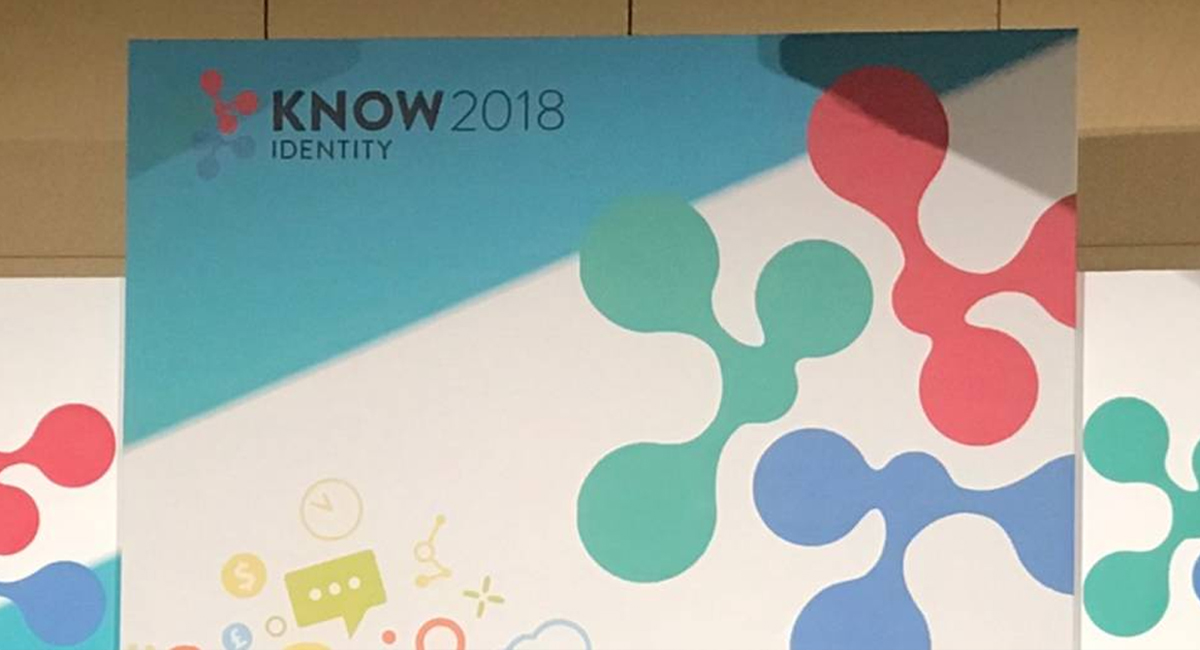
April 17, 2018 | Veratad Blog | Category: Veratad Technologies Blog
Alexa, Who is Scott Galloway?
Alexa, who is Scott Galloway?
He is an Australian professional soccer player.
We had a stellar time at the KNOW Identity 2018 conference in Washington, D.C. in March 2018. Prior to heading down to D.C., we shared which sessions we were the most excited about – and they did not disappoint. Over the next few weeks, we will be sharing some of the highlights and our favorite moments from the panel sessions and the various keynotes.
The opening keynote at the KNOW Identity 2018 conference was on The Break Up of Big Tech by Scott Galloway, who is “a professor at the NYU Stern School of Business, … founder of Red Envelope, Prophet Brand Strategy, and L2 Inc. … His book, The Four (Portfolio Penguin, 2017), debuted on the New York Times and Wall Street Journal bestseller lists in the hardcover non-fiction and hardcover business categories” (OWI).
Galloway’s keynote took us through The Four and the various influences Amazon, Apple, Facebook, and Google have on our lives and the economy – and he spared no feelings in a delightfully humorous and engaging way. He paints The Four as our new brain, our source of love, our consumptive gut and Apple is sex. Their ability to tap into basic human instincts has aggregated more market cap than a majority of the nation’s GDP.
The rise of these four to the top has been swift. In 2006 the five largest companies included Exxon, GE, Microsoft, Citi, and Bank of America. Now it’s all big tech – Apple, Alphabet, Microsoft, Amazon, and Facebook. Now that they are at the top, Galloway explained exactly why they should now be broken up.
Galloway was quick to jump into the depths and point out that there are no real consequences for these companies. While they are fined for breaking regulations, we, as voters, are allowing it by not electing officials who enforce the regulations appropriately. When Facebook was fined $122 million dollars for providing incorrect and misleading information about its acquisition of WhatsApp, he showed how the fines incurred were less costly than the price to do these correctly with that $16 billion dollar merger. Similarly, Google incurred a $2.7 billion dollar antitrust fine in the EU, 3% of their cash on hand, and their stock rose.
Galloway devoted a lot of time to Amazon in this presentation.
He launched into how Amazon’s ability to perform Jedi mind tricks with their stock prices. Generally, when a company announces that it will have a good quarter, its stock falls. Not Amazon’s. Amazon announces its acquisition of Whole Foods and competing grocery stores slash their prices and their stocks fall.
Not so long ago, The U.S. Department of Justice was blocking AT&T’s acquisition of Time Warner to protect consumers from price hikes and monopolies. While the white house is worrying about cable, he shared some fun statistics about the cost of capital. 4% of all retail sales are on Amazon, but 44% of all U.S. e-commerce sales. 66% of households have Prime – that’s more than voted in the US 2016 election and more households than have cable television. Scary, we know.
Those stats become more jarring when you consider that more and more households are opting into streaming services like Amazon Prime, over cable. Amazon Video includes $4.5 billion spent on original content for their streaming service ($6B for Netflix).
The future is voice. How many of us wake up and ask Alexa what today’s weather is? To play some music or calculate some conversions? Amazon has 70% of the market share in voice. Want more fun stats on the cost of capital? Walmart paid $64 billion in corporate income taxes since 2008. Amazon paid about one billion. More successful companies are paying less in taxes.
He continued the presentation by diving into online advertising. “Two players own the future” – Facebook and Google. As their revenue grows, everyone else’s is declining.
Facebook has arguably won mobile by owning six of the top ten most downloaded apps on Android (WhatsApp, Facebook Messenger, Instagram, Facebook, Facebook lite, and Messenger lite, in case you were wondering.)
Facebook has won mobile in other ways as well. Back in 2015, the world spend an average of 20 minutes a day on Facebook. That number has only climbed to 35 minutes a day. In the U.S. we now spend about four hours a day on mobile, with the top five apps (Youtube, Facebook, Snapchat, Instagram, and Twitter) accounting for nearly half of that time.
The key to competitive markets is that no one company has too much power. Galloway compellingly argues that we should break up the big four because we’re capitalist – these markets are no longer competitive. Regulation and Anti-trust busting will oxygenate the market when done carefully and methodically.
Galloway explores one of his two metrics of a great nation – the success of the middle class. It shouldn’t come as a surprise that ours (the US) isn’t doing all that well. Galloway suggests that we’re no longer looking to create millionaires, but the first trillionaire.
Galloway ended his keynote with a prompt for the audience: in two ecosystems, one with The Four, and one where The Four are broken up into 11 companies, which would provide a more diverse ecosystem? Which one would have a broader tax base, more jobs, more millionaires, and maybe fewer billionaires? The answer becomes rather obvious – smaller companies create more diversity. “Search your feelings, you know this to be true,” he finished with a strong message, “It is time to break these four up because we are capitalists!”



